Pope: “Education helps the new generations to grow”
Audience to a Delegation from the Sulkhan-Saba Orbeliani University of Tbilisi (Georgia)
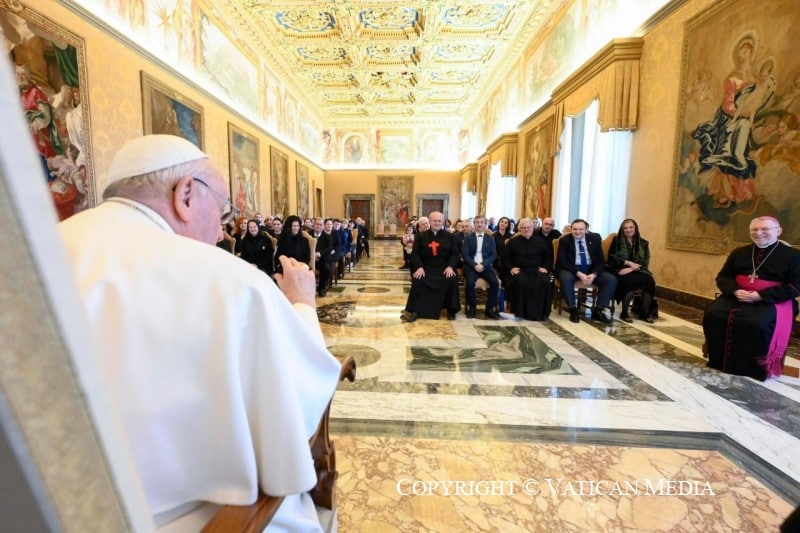
This morning, in the Vatican Apostolic Palace, the Holy Father Francis received in Audience a Delegation from the Sulkhan-Saba Orbeliani University of Tbilisi (Georgia).
We publish below the speech that the Pope addressed to those present at the Audience:
Address of the Holy Father
Dear brothers and sisters, gamarjobat! [Good morning!]
I thank Archbishop Pasotto for his words, which began with a melancholy adagio: “Who would have thought…”, that melancholy of memories… Thank you, thank you. And I welcome you all, professors, students and friends of Sulkhan-Saba Orbeliani Univesrity, which recently reached its twentieth anniversary: ghilotsav! [Best wishes!]. It is young, twenty years…
Thank you for your visit, and for what you do: you offer a good example of impassioned cultural research and care for the inestimable good that is the formative growth of young people. Education does precisely this: it helps the young generations to grow, discovering and cultivating the most fruitful roots, so that they may bear fruit. This corresponds well to the identity of Georgia, a young country but with an ancient history, a land blessed by Heaven, of which I conserve happy memories. I am reminded of Patriarch Ilia – a great man! You know, when I am a bit sad, I listen to his music, his songs: it does me good! He is good, a man of God whom I hold in my prayers and whose admirable musical compositions I like to listen to. I carry in my heart the meetings we had, especially in the Patriarchal Cathedral, when we stood side by side alongside Christ’s tunic, that tunic the Gospel describes as being “without seam, woven from top to bottom” (Jn 19:23), and which, according to tradition, symbolizes the unity of the Church, Body of Christ. Your university also represents a fine example of the fruitful collaboration between Catholics and Orthodox in the cultural and educational sphere. Also, I do not forget that bombino that Patriarch Ilia made me try: dangerous, isn’t it? Strong, but very good!
I know that in the noble Georgian language the term education, “ganatleba”, is very interesting: it derives from the word light and evokes the passage from the obscurity of ignorance to the luminosity of knowledge. Education, for you, means to return to the light; it is a synonym of enlightenment. This is significant: it makes us think of when one lights a lamp in a dark room. Nothing within is altered, but the appearance of everything changes. Such is the knowledge acquired at your university, which aims to place the dignity of the human being at the centre. Through study and commitment one can therefore achieve, as the ancient Oracle of Delphi recited, self-knowledge, γνῶθι σαυτόν. And it is important also for faith, so much so that an ancient monk wrote: “Do you want to know God? Begin by knowing yourself” (EVAGRIUS PONTICUS, Sentences, Rome 2020, 72).
There is a need for this beneficial enlightenment of knowledge, while the world the darkness of hatred thickens, which often comes from forgetfulness and indifference. Yes, it is often forgetfulness and indifference that make everything appear dark and indistinct, whereas culture and education restore the memory of the past and shed light on the present. This is essential for the growth of a young person, but also of a society because, as one of the fathers of your country used to say, “the fall of a people begins where the memory of the past ends” (I. CHAVCHAVADZE, People and History, in Iveria, 1888). The fall of a people begins where the memory of the past ends. On the contrary, with God’s help, “everything is possible for an educated man” (ID. Letters of a Traveller, Santa Maria di Castellabate, 2021, 59). Georgian culture invites us to keep alight the lamp of education and to keep the window of faith open, because both of them illuminate the rooms of life. Not by chance, the root of the word light in Georgian appears both in the word education and in the word baptism, thereby linking culture and faith.
Dear friends, the history of Georgia tells of many passages from darkness to light, because your country has always managed to rise again and to shine, even when, several times throughout the centuries, it has suffered foreign invasions and domination. And I think of that piece of land that has still been removed. Your people, jovial and courageous, welcoming and in love with life, have known how to cultivate, even in the bleakest periods, a positive attitude precisely because of their faith and culture. In this, the role of the Catholic Church is valuable. She has enabled fruitful cultural openings which have benefited the history of the country. You represent the continuity of that contribution and it is good that, in a joyful and constructive way, you nourish the service on Georgian soil of the Catholic community, so that it may be a seed that bears fruit for all. I invite you to continue this humble and fraternal service; I know that, to the various faculties that already exist, you are adding that of medicine, which will do a great deal of good.
This role of creating spaces and creating bridges for the good of a country of its people is inscribed in the name of your Institute, dedicated to the great Sulkha-Saba Orbeliani, the quintessential Georgian diplomat, a person of notable culture and openness. The Georgians, starting from the young, deserve to have wider opportunities. And at the same time, the typical Georgian humanism, in its uniqueness and beauty, deserves to be appreciated elsewhere, with its art, literature, music and many other valid expressions, which can always be enriched through respectful exchange with other cultures. Light is an example to us also in this: it does not exist to be seen, but to enable to see. Light does not exist to be seen, but to see around and to see more: thus is culture, which opens up horizons and expands limits.
I hope, then, that you can be a “gentle light” for many young people, as I reiterate my gratitude for what you do. And I ask you, please, to remember me in your prayers. Didi madloba [Thank you very much].
_____________________________________
Holy See Press Office Bulletin, 13 February 2023
Related
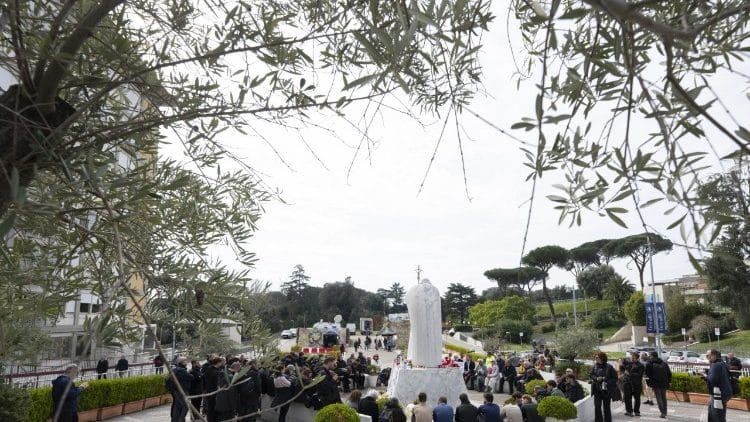
Pope at Gemelli Hospital: Peaceful Night
Exaudi Staff
12 March, 2025
1 min
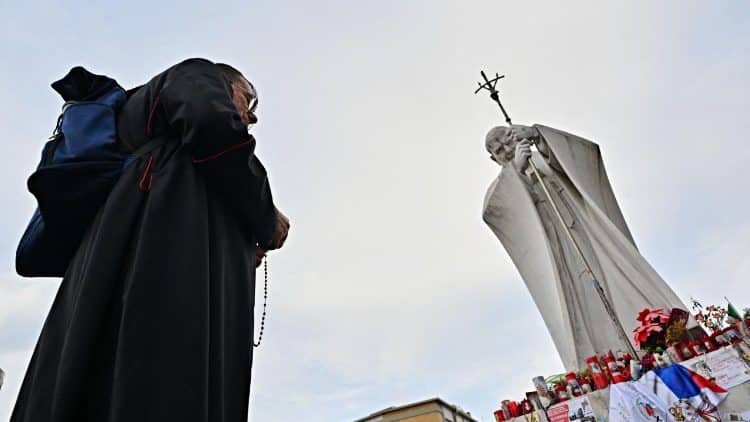
Pope at Gemelli Hospital: Slight Improvement
Exaudi Staff
11 March, 2025
1 min
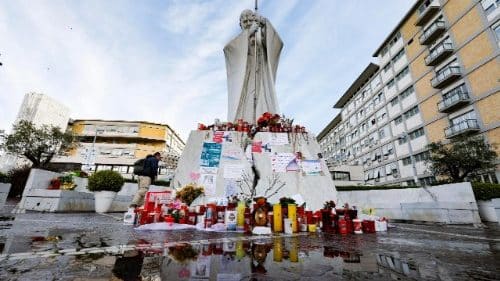
Pope Francis spent a peaceful night at the Gemelli Polyclinic
Exaudi Staff
11 March, 2025
1 min
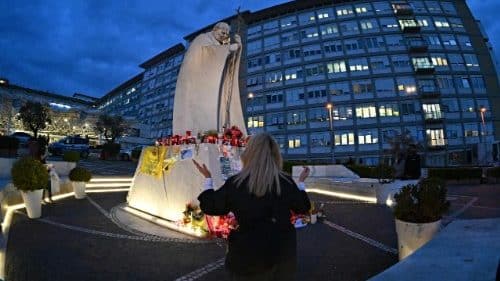
Pope Francis shows stable improvement
Exaudi Staff
10 March, 2025
1 min
 (EN)
(EN)
 (ES)
(ES)
 (IT)
(IT)

